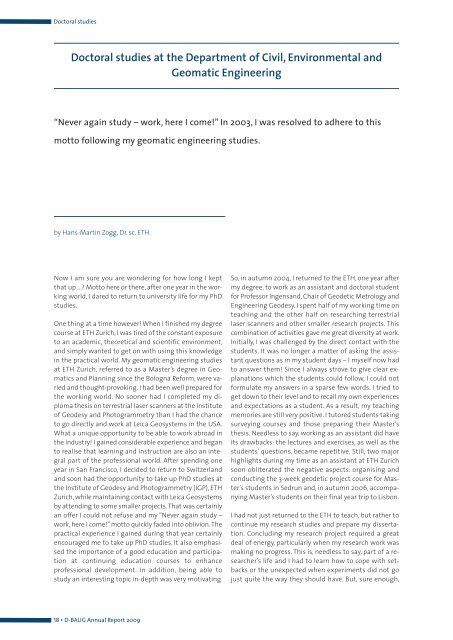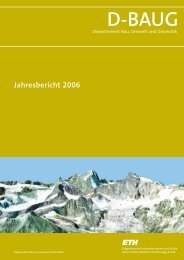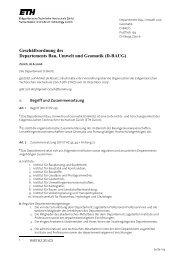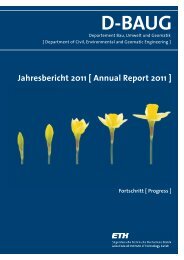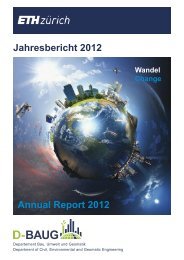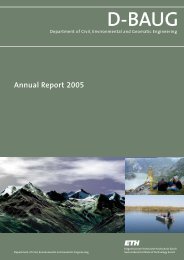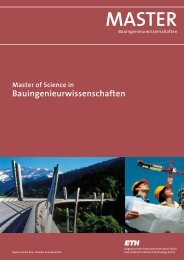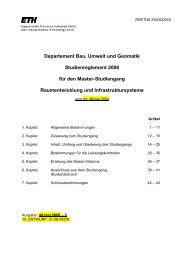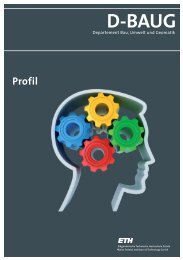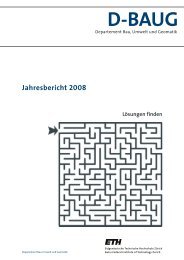D-BAUG - Departement Bau, Umwelt und Geomatik - ETH Zürich
D-BAUG - Departement Bau, Umwelt und Geomatik - ETH Zürich
D-BAUG - Departement Bau, Umwelt und Geomatik - ETH Zürich
Create successful ePaper yourself
Turn your PDF publications into a flip-book with our unique Google optimized e-Paper software.
Doctoral studies<br />
Doctoral studies at the Department of Civil, Environmental and<br />
Geomatic Engineering<br />
“Never again study – work, here I come!” In 2003, I was resolved to adhere to this<br />
motto following my geomatic engineering studies.<br />
by Hans-Martin Zogg, Dr. sc. <strong>ETH</strong><br />
Now I am sure you are wondering for how long I kept<br />
that up ...? Motto here or there, after one year in the working<br />
world, I dared to return to university life for my PhD<br />
studies.<br />
One thing at a time however! When I finished my degree<br />
course at <strong>ETH</strong> Zurich, I was tired of the constant exposure<br />
to an academic, theoretical and scientific environment,<br />
and simply wanted to get on with using this knowledge<br />
in the practical world. My geomatic engineering studies<br />
at <strong>ETH</strong> Zurich, referred to as a Master’s degree in Geomatics<br />
and Planning since the Bologna Reform, were varied<br />
and thought-provoking. I had been well prepared for<br />
the working world. No sooner had I completed my diploma<br />
thesis on terrestrial laser scanners at the Institute<br />
of Geodesy and Photogrammetry than I had the chance<br />
to go directly and work at Leica Geosystems in the USA.<br />
What a unique opportunity to be able to work abroad in<br />
the industry! I gained considerable experience and began<br />
to realise that learning and instruction are also an integral<br />
part of the professional world. After spending one<br />
year in San Francisco, I decided to return to Switzerland<br />
and soon had the opportunity to take up PhD studies at<br />
the Institute of Geodesy and Photogrammetry (IGP), <strong>ETH</strong><br />
Zurich, while maintaining contact with Leica Geosystems<br />
by attending to some smaller projects. That was certainly<br />
an offer I could not refuse and my “Never again study –<br />
work, here I come!” motto quickly faded into oblivion. The<br />
practical experience I gained during that year certainly<br />
encouraged me to take up PhD studies. It also emphasised<br />
the importance of a good education and participation<br />
at continuing education courses to enhance<br />
professional development. In addition, being able to<br />
study an interesting topic in-depth was very motivating.<br />
18 ▪ D-<strong>BAUG</strong> Annual Report 2009<br />
So, in autumn 2004, I returned to the <strong>ETH</strong>, one year after<br />
my degree, to work as an assistant and doctoral student<br />
for Professor Ingensand, Chair of Geodetic Metrology and<br />
Engineering Geodesy. I spent half of my working time on<br />
teaching and the other half on researching terrestrial<br />
laser scanners and other smaller research projects. This<br />
combination of activities gave me great diversity at work.<br />
Initially, I was challenged by the direct contact with the<br />
students. It was no longer a matter of asking the assistant<br />
questions as in my student days – I myself now had<br />
to answer them! Since I always strove to give clear explanations<br />
which the students could follow, I could not<br />
formulate my answers in a sparse few words. I tried to<br />
get down to their level and to recall my own experiences<br />
and expectations as a student. As a result, my teaching<br />
memories are still very positive. I tutored students taking<br />
surveying courses and those preparing their Master’s<br />
thesis. Needless to say, working as an assistant did have<br />
its drawbacks: the lectures and exercises, as well as the<br />
students’ questions, became repetitive. Still, two major<br />
highlights during my time as an assistant at <strong>ETH</strong> Zurich<br />
soon obliterated the negative aspects: organising and<br />
conducting the 3-week geodetic project course for Master’s<br />
students in Sedrun and, in autumn 2006, accompanying<br />
Master’s students on their final year trip to Lisbon.<br />
I had not just returned to the <strong>ETH</strong> to teach, but rather to<br />
continue my research studies and prepare my dissertation.<br />
Concluding my research project required a great<br />
deal of energy, particularly when my research work was<br />
making no progress. This is, needless to say, part of a researcher’s<br />
life and I had to learn how to cope with setbacks<br />
or the unexpected when experiments did not go<br />
just quite the way they should have. But, sure enough,


